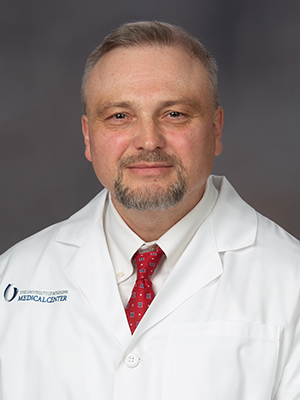Dr. Pawel T. Pomianowski named director of the Division of Medical Genetics and Genomics

Dr. Pawel T. Pomianowski, assistant professor in the School of Medicine, is the director of the new Division of Medical Genetics and Genomics within the Department of Medicine. Pomianowski brings over 15 years of experience in hospital and clinical practice. His expertise includes founding one of only two genetic counseling and risk assessment programs for U.S. veterans on the East Coast and establishing a comprehensive genetic department in Delaware.
Under Pomianowski's leadership, the Division of Medical Genetics and Genomics is utilizing information about the human genome and disease to transform how doctors predict, diagnose and treat cancer with greater precision. He oversees the Adult Genetic Risk Assessment Program, which offers consultation, genetic testing and support for families with a hereditary risk of certain cancers and other diseases. This program is unique to Mississippi and the only one of its kind in the state.
“We are unique among many institutions with our focus on both clinical genetics and genomics to help guide the care of our patients,” said Pomianowski. “This is a fundamentally different approach from many other institutions down south, which are primary research based and where clinical genetics often takes a back seat.”
To support this patient-centered approach, the department uses germline genetic testing to identify inherited genetic changes. When needed, this test helps doctors make more personalized treatment decisions based on the patient’s family history. Genetic counseling for these family members, focused on cancer risk factors and preventive measures, can help lower their chances of developing the disease later on.
“Next generation sequencing technology allows us to look at individual rare variants or gene alterations that play a significant role in cancer development,” said Pomianowski. “In this way we can design a specific cancer treatment plan for each individual patient and also predict cancer risks for other members of the family who may still be cancer free.”
The clinical team, in collaboration with UMMC Molecular and Genomics Core Facility, is hoping to develop an in-house clinical program for whole genome sequencing, allowing clinicians to analyze patient genomes without the limitations of standard gene panels. Pomianowski notes that this approach will enable reanalysis as new genetic discoveries are made. As understanding of genetic diseases and variants continues to expand, clinicians will use a "polygenic risk score" to evaluate a patient's risk based on their genetic makeup.
“Having a whole genome sequencing program at our institution will allow us to interpret patient genomes for common variants with small effects which are the basis of polygenic risk scores,” he said. “These risk scores, although not ready for prime time yet, are right around the corner for more widespread use in both cancer and cardiovascular genetics.”
Pomianowski also notes that some genetic variants are rare in certain parts of the world but more common in others. “An in-house genomic database would be a genetic map of UMMC’s unique patient community,” he said.


